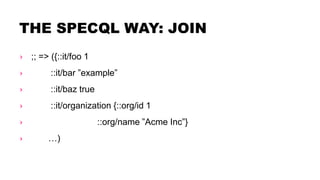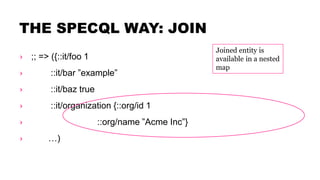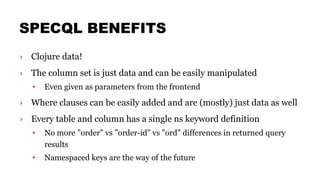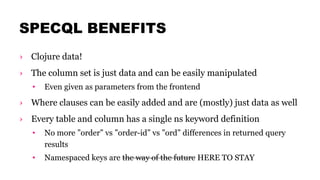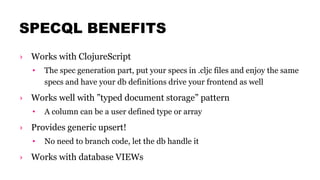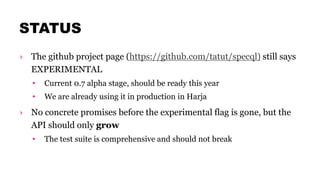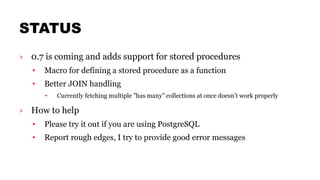Specql is a Clojure library that combines Clojure spec, PostgreSQL, and macros to provide a cleaner way of writing SQL queries and managing database interactions. It defines tables and columns as Clojure data, allowing column sets and where clauses to be easily manipulated. This avoids issues like duplicate code and unnecessary data fetching. Specql returns query results as Clojure data with namespaced keywords, handling joins and relationships between tables. It aims to provide benefits like type safety, upsert support, and integration with both Clojure and ClojureScript. The author is looking for others to try it out and provide feedback to improve the library.
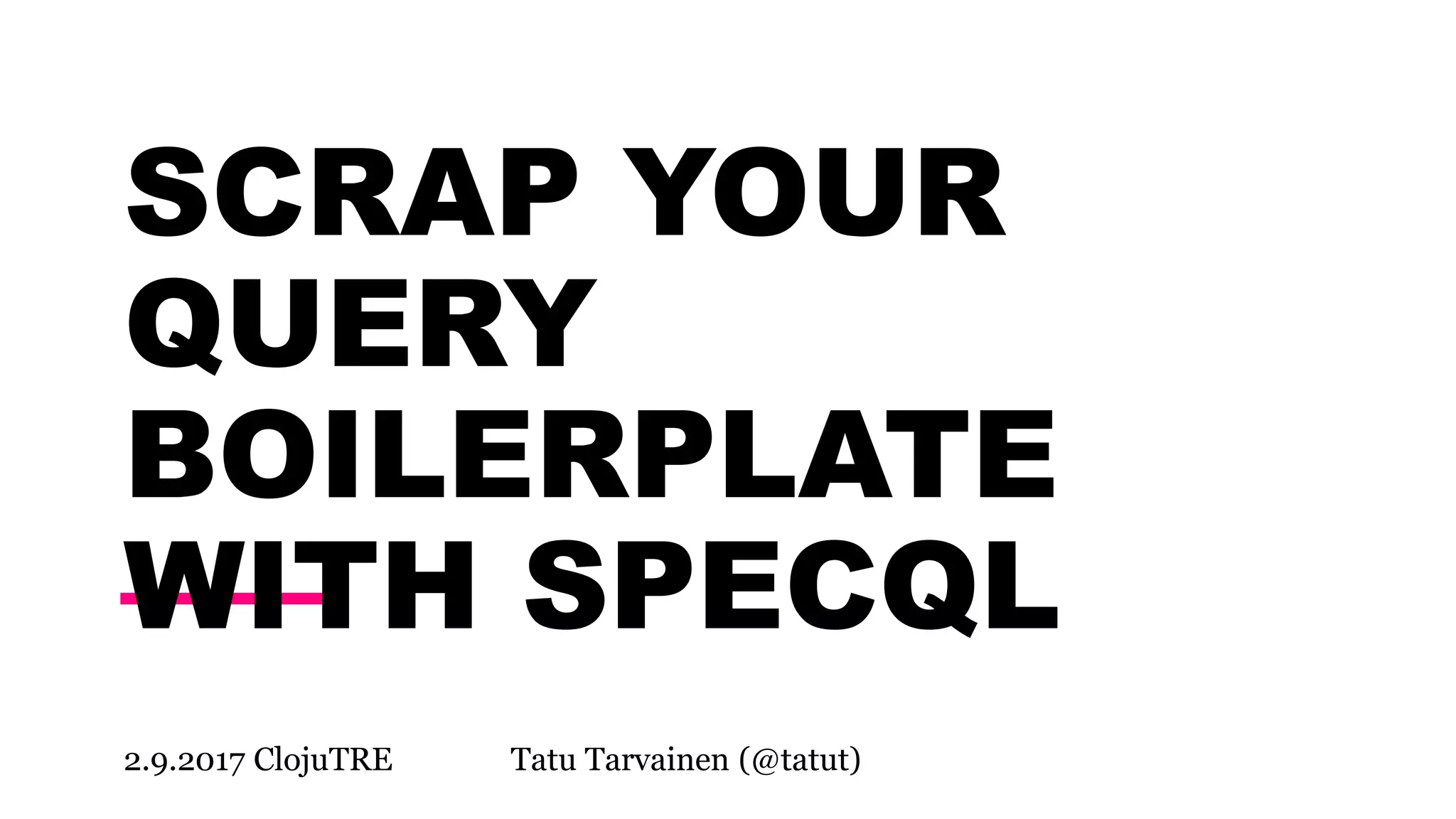
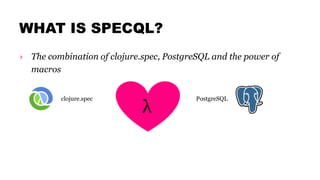
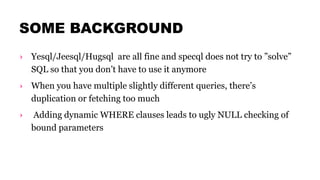
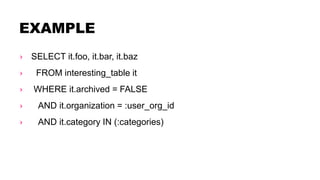
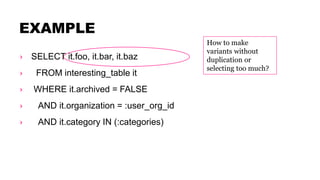
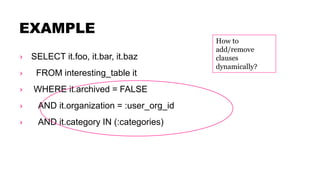
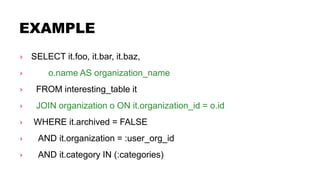
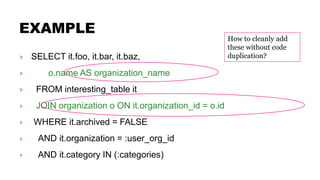
![THE SPECQL WAY: DEFINE
› (define-tables db
› [”interesting_table” ::it/interesting
› {::it/organization (rel/has-one
› ::it/organization_id
› ::org/organization
› ::org/id)}])](https://image.slidesharecdn.com/specql-clojutre-170903055551/85/Scrap-your-query-boilerplate-with-specql-9-320.jpg)
![THE SPECQL WAY: DEFINE
› (define-tables db
› [”interesting_table” ::it/interesting
› {::it/organization (rel/has-one
› ::it/organization_id
› ::org/organization
› ::org/id)}])
The main macro
for defining things](https://image.slidesharecdn.com/specql-clojutre-170903055551/85/Scrap-your-query-boilerplate-with-specql-10-320.jpg)
![THE SPECQL WAY: DEFINE
› (define-tables db
› [”interesting_table” ::it/interesting
› {::it/organization (rel/has-one
› ::it/organization_id
› ::org/organization
› ::org/id)}])
The name of the
table in the
database](https://image.slidesharecdn.com/specql-clojutre-170903055551/85/Scrap-your-query-boilerplate-with-specql-11-320.jpg)
![THE SPECQL WAY: DEFINE
› (define-tables db
› [”interesting_table” ::it/interesting
› {::it/organization (rel/has-one
› ::it/organization_id
› ::org/organization
› ::org/id)}])
The namespaced
keyword for the
table](https://image.slidesharecdn.com/specql-clojutre-170903055551/85/Scrap-your-query-boilerplate-with-specql-12-320.jpg)
![THE SPECQL WAY: DEFINE
› (define-tables db
› [”interesting_table” ::it/interesting
› {::it/organization (rel/has-one
› ::it/organization_id
› ::org/organization
› ::org/id)}])
Additional
definitions for
columns](https://image.slidesharecdn.com/specql-clojutre-170903055551/85/Scrap-your-query-boilerplate-with-specql-13-320.jpg)
![THE SPECQL WAY: FETCH
› (defn fetch-interesting [db org-id categories]
› (fetch db ::it/interesting
› #{::it/foo ::it/bar ::it/baz}
› {::it/archived false
› ::it/organization_id org-id
› ::it/category (op/in categories)}))](https://image.slidesharecdn.com/specql-clojutre-170903055551/85/Scrap-your-query-boilerplate-with-specql-14-320.jpg)
![THE SPECQL WAY: FETCH
› (defn fetch-interesting [db org-id categories]
› (fetch db ::it/interesting
› #{::it/foo ::it/bar ::it/baz}
› {::it/archived false
› ::it/organization_id org-id
› ::it/category (op/in categories)}))
The table to fetch
from](https://image.slidesharecdn.com/specql-clojutre-170903055551/85/Scrap-your-query-boilerplate-with-specql-15-320.jpg)
![THE SPECQL WAY: FETCH
› (defn fetch-interesting [db org-id categories]
› (fetch db ::it/interesting
› #{::it/foo ::it/bar ::it/baz}
› {::it/archived false
› ::it/organization_id org-id
› ::it/category (op/in categories)}))
Set of columns to
retrieve](https://image.slidesharecdn.com/specql-clojutre-170903055551/85/Scrap-your-query-boilerplate-with-specql-16-320.jpg)
![THE SPECQL WAY: FETCH
› (defn fetch-interesting [db org-id categories]
› (fetch db ::it/interesting
› #{::it/foo ::it/bar ::it/baz}
› {::it/archived false
› ::it/organization_id org-id
› ::it/category (op/in categories)}))
The WHERE
clause map](https://image.slidesharecdn.com/specql-clojutre-170903055551/85/Scrap-your-query-boilerplate-with-specql-17-320.jpg)
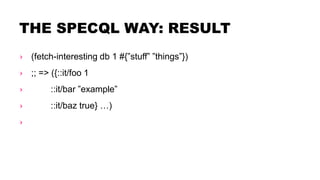
![THE SPECQL WAY: JOIN
› (fetch db ::it/interesting
› #{::it/foo ::it/bar ::it/baz
› [::it/organization #{::org/id ::org/name}]}
› {::it/archived false
› ::it/organization_id org-id
› ::it/category (op/in categories)}))](https://image.slidesharecdn.com/specql-clojutre-170903055551/85/Scrap-your-query-boilerplate-with-specql-19-320.jpg)
![THE SPECQL WAY: JOIN
› (fetch db ::it/interesting
› #{::it/foo ::it/bar ::it/baz
› [::it/organization #{::org/id ::org/name}]}
› {::it/archived false
› ::it/organization_id org-id
› ::it/category (op/in categories)}))
Nested column definition
for a JOINed tables](https://image.slidesharecdn.com/specql-clojutre-170903055551/85/Scrap-your-query-boilerplate-with-specql-20-320.jpg)
